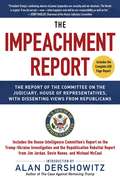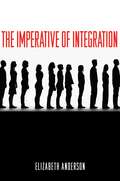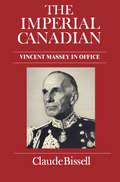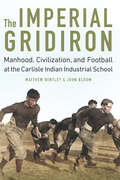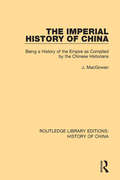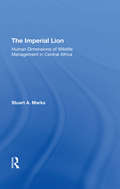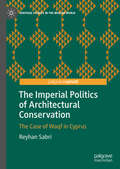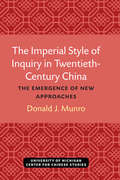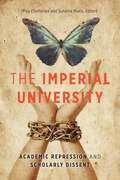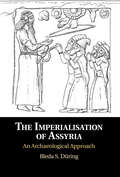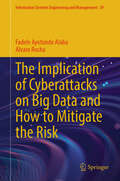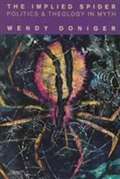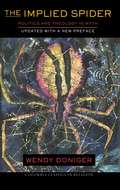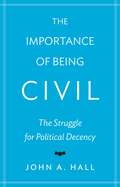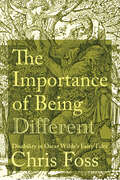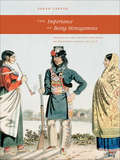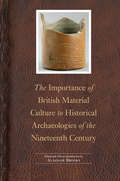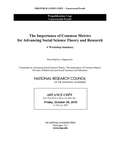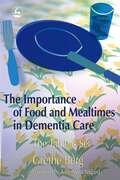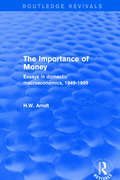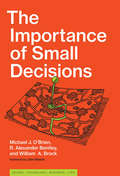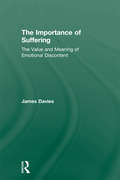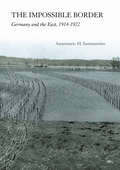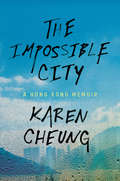- Table View
- List View
The Impeachment Report: The Report of the Committee on the Judiciary, House of Representatives, with Dissenting Views from Republicans
by U.S. House Committee on the JudiciaryThe Official Report of the House Judiciary Committee on the Impeachment—Plus the Dissenting Views from Republicans, the full Impeachment Inquiry Report on The Results of The Trump-Ukraine Investigation, the Articles of Impeachment and the Republican Report Disputing the Results of the Democratic Investigation, as well as an Introduction by Acclaimed Legal Scholar Alan Dershowitz This groundbreaking report—released by the US House Committee on the Judiciary, chaired by Jerry Nadler—contains the results of the impeachment inquiry into President Donald Trump&’s actions as he sought for Ukraine to announce investigations into Hunter Biden, as well as an explanation of the committee's process and its justification for recommending two articles of impeachment against Trump, abuse of power and obstruction of Congress. This new report, separated into four parts, details the process by which the House Intelligence Committee investigated the case against Trump. Part Two is dedicated to examining the standards of impeachment laid out in the Constitution. Part Three delves into the proof and details of the Democrats' case that Trump abused the power of his office to pressure the Ukrainian government to investigate his political rival and interfere in the 2020 presidential election. Finally, Part Four makes the case that President Trump obstructed Congress's ability to hold the executive branch accountable by defying House investigators' requests for documents and testimony. Besides including the House Judiciary Committee's full report, The Impeachment Report also presents the Dissenting Views from Republicans, the findings of the Intelligence Committee&’s investigation in the full original impeachment report, the articles of impeachment themselves, a rebuttal report from Republican representatives that disputes the process and results of the Democratic investigation, and an introduction by esteemed attorney Alan Dershowitz. It is the ultimate resource for anyone who wants to know whether impeachment is warranted, and is a critical text in the ongoing back-and-forth battle to protect American democracy.
The Imperative of Integration
by Elizabeth AndersonA powerful new argument for reviving the ideal of racial integrationMore than forty years have passed since Congress, in response to the Civil Rights Movement, enacted sweeping antidiscrimination laws in the Civil Rights Act of 1964, the Voting Rights Act of 1965, and the Fair Housing Act of 1968. As a signal achievement of that legacy, in 2008, Americans elected their first African American president. Some would argue that we have finally arrived at a postracial America, but The Imperative of Integration indicates otherwise. Elizabeth Anderson demonstrates that, despite progress toward racial equality, African Americans remain disadvantaged on virtually all measures of well-being. Segregation remains a key cause of these problems, and Anderson skillfully shows why racial integration is needed to address these issues. Weaving together extensive social science findings—in economics, sociology, and psychology—with political theory, this book provides a compelling argument for reviving the ideal of racial integration to overcome injustice and inequality, and to build a better democracy.Considering the effects of segregation and integration across multiple social arenas, Anderson exposes the deficiencies of racial views on both the right and the left. She reveals the limitations of conservative explanations for black disadvantage in terms of cultural pathology within the black community and explains why color blindness is morally misguided. Multicultural celebrations of group differences are also not enough to solve our racial problems. Anderson provides a distinctive rationale for affirmative action as a tool for promoting integration, and explores how integration can be practiced beyond affirmative action.Offering an expansive model for practicing political philosophy in close collaboration with the social sciences, this book is a trenchant examination of how racial integration can lead to a more robust and responsive democracy.
The Imperial Canadian
by Claude BissellAristocrat, democrat, diplomat, cultural advocate, anglophile, fiercely proud Canadian--Vincent Massey was a complex, sometimes enigmatic figure. This finely crafted portrait of Massey's middle and later years, drawn extensively from its subject's diaries and papers, recalls a life of deep commitment to the service of his country and its culture.From 1935 to 1946 he served as Canada's high commissioner to London, a role for which he was perfectly suited: his love of English traditions and values was exceeded only by his intense Canadian patriotism. He served well. The courage and generosity of Vincent and Alice Massey made them favourites with Canadian servicemen in Britain during the war years. His familiarity with, and enthusiasm for, all royal ritual was invaluable to the Canadian delegations during the ceremonies surrounding the coronation of George VI. His proud representation of Canada's cultural accomplishments opened British doors to many Canadian artists.The years in London were happy ones for Massey, at home as he was in the country life of the English upper classes. They were followed by a period of frustration. Mackenzie King was minister of external affairs as well as prime minister during Massey's stint as high commissioner, and was therefore Massey's immediate superior. Relations between the two were never very warm--Mackenzie King considered Massey a snob with dangerous ambitions--and when Massey returned to Canada contemplating a political position, possibly a cabinet post, his path was completely blocked.For a time Massey returned to the academic environment he so enjoyed, as chancellor of the University of Toronto. But two of his greatest achievements were still to come. One was the establishment of the royal commission on culture, which bore his name and led ultimately to the creation of the Canada Council. The other was his appointment as governor-general, the first Canadian ever to hold the post.Claude Bissell has followed his award-winning book, The Young Vincent Massey, with another superbly written volume that explores the attitudes, prejudices, commitments, and passions that shaped Massey's life. This is a revealing portrait of a man whose contributions continue to enrich the lives of Canadians.
The Imperial Gridiron: Manhood, Civilization, and Football at the Carlisle Indian Industrial School
by Matthew Bentley John D. BloomThe Imperial Gridiron examines the competing versions of manhood at the Carlisle Indian Industrial School between 1879 and 1918. Students often arrived at Carlisle already engrained with Indigenous ideals of masculinity. On many occasions these ideals would come into conflict with the models of manhood created by the school&’s original superintendent, Richard Henry Pratt. Pratt believed that Native Americans required the &“embrace of civilization,&” and he emphasized the qualities of self-control, Christian ethics, and retaliatory masculinity. He encouraged sportsmanship and fair play over victory. Pratt&’s successors, however, adopted a different approach, and victory was enshrined as the main objective of Carlisle sports. As major stars like Jim Thorpe and Lewis Tewanima came to the fore, this change in approach created a conflict over manhood within the school: should the competitive athletic model be promoted, or should Carlisle focus on the more self-controlled, Christian ideal as promoted by the school&’s Young Men&’s Christian Association? The answer came from the 1914 congressional investigation of Carlisle. After this grueling investigation, Carlisle&’s model of manhood starkly reverted to the form of the Pratt years, and by the time the school closed in 1918, the school&’s standards of masculinity had come full circle.
The Imperial History of China: Being a History of the Empire as Compiled by the Chinese Historians (Routledge Library Editions: History of China #9)
by J. MacGowanThis work, first published in 1897, is neither more nor less than the history of China as it has been written during successive ages by the authorized historians of the Empire. The documents on which the work is based, together with the writings of Confucius and Mencius, are the only truly authentic sources from which the story of the long-lived nation can be obtained. Commencing with the mythical and legendary periods, the work moves on through successive dynasties until that of the Ts’ing concluding its account in the early years of the twentieth century.
The Imperial Lion: Human Dimensions Of Wildlife Management In Central Africa
by Stuart A MarksIn the 1950s biologists became alarmed by the plight of Africa’s wildlife. Since then they have sought to arrest its decline, but increasing competition between wild fauna and expanding human populations shows that protection alone has been inadequate. The conservationists’ position and strategies have been progressively eroded: large-scale game cropping schemes have failed to produce expected revenues, the consequences of the tourist industry have been unexpectedly detrimental, and educational programs have rarely convinced rural Africans to conserve resources. Dr. Marks argues that the management and conservation of wild animals in Third World countries must include cultural as well as biological dimensions and that changes in human social systems will be necessary to sustain wildlife and the environmental processes. He describes indigenous attempts to manage wildlife and suggests new research initiatives that would lead to wildlife policies more in keeping with human development needs and with the realities of the rural countryside.
The Imperial Politics of Architectural Conservation: The Case of Waqf in Cyprus (Heritage Studies in the Muslim World)
by Reyhan SabriThis book documents the changing role of the Islamic Waqf institution in Cyprus and the conservation of Waqf heritage buildings of Ottoman and Western origins. Previously ignored archives of documents detailing the conservation of Waqf buildings during Ottoman and British rule allow a fine-grained analysis of the colonial introduction of Western approaches to heritage conservation. Colonial rule saw major legislative and administrative changes to the originally autonomous Ottoman Waqf institution, which had already been subject to reforms under the Ottoman regime. Under British rule, Western heritage concepts and modern architectural conservation discourses became the core conservation principles in Cyprus. Earlier centralisation attempts during the Ottoman Tanzimat (1831-1876), and the procedural, technical, and political reconfigurations during the British colonial era in Cyprus (1878-1960), were key factors of the transformation of the Waqf’s traditional building upkeep system. These imperial interventions, their orientalist mindset, and the rise of nationalism, finally led to the erosion of Waqf in Cyprus as a non-Western and sustainable form of building conservation. This study reveals how the Western approach, the forms of expertise it privileges, and pragmatic diversions from this practice for political purposes, were useful in neutralizing the legitimacy of local practices, except in cases where opportunistic ‘recognition’ of their utility played a role in inter-communal, colonial, nationalist, and inter-imperial politics.
The Imperial Style of Inquiry in Twentieth-Century China: The Emergence of New Approaches (Michigan Monographs In Chinese Studies #72)
by Donald J. MunroHow have traditional Chinese ways of thinking affected problem solving in this century? The traditional, imperial style of inquiry is associated with the belief that the universe is a coherent, internally structured unity understandable through the similarly structured human mind. It involves a reliance on antecedent and authoritarian models, coupled with an introspective focus in investigations, at some cost to objective fact gathering. In contrast, emergent forms of inquiry are guided by the values of individual autonomy and new perspectives on objectivity. In the 1930s and 1940s, some liberal educators held the model of Western science in great esteem, and some scientists practicing objective inquiry helped to create an awareness in the urban areas of inquiry not directed by political values. Drawing on philosophical, social science, and popular culture materials, Donald Munro shows that the two strains coexisted in twentieth century China as mixed motives. Many important figures were motivated by a desire to act consistently with the social values associated with the premodern or received view of knowledge and inquiry. At the same time, these people often had other motives, such as utilitarian values, efficiency, and entrepreneurship. Munro argues that while many competing positions can coexist in the same person, the seeds of the positive, instrumental value of individual autonomy in Chinese inquiry are beginning to compete in both scholarly and popular culture with other, older approaches.
The Imperial University: Academic Repression and Scholarly Dissent
by Sunaina Maira Piya ChatterjeeAt colleges and universities throughout the United States, political protest and intellectual dissent are increasingly being met with repressive tactics by administrators, politicians, and the police—from the use of SWAT teams to disperse student protestors and the profiling of Muslim and Arab American students to the denial of tenure and dismissal of politically engaged faculty. The Imperial University brings together scholars, including some who have been targeted for their open criticism of American foreign policy and settler colonialism, to explore the policing of knowledge by explicitly linking the academy to the broader politics of militarism, racism, nationalism, and neoliberalism that define the contemporary imperial state.The contributors to this book argue that &“academic freedom&” is not a sufficient response to the crisis of intellectual repression. Instead, they contend that battles fought over academic containment must be understood in light of the academy&’s relationship to U.S. expansionism and global capital. Based on multidisciplinary research, autobiographical accounts, and even performance scripts, this urgent analysis offers sobering insights into such varied manifestations of &“the imperial university&” as CIA recruitment at black and Latino colleges, the connections between universities and civilian and military prisons, and the gender and sexual politics of academic repression.Contributors: Thomas Abowd, Tufts U; Victor Bascara, UCLA; Dana Collins, California State U, Fullerton; Nicholas De Genova; Ricardo Dominguez, UC San Diego; Sylvanna Falcón, UC Santa Cruz; Farah Godrej, UC Riverside; Roberto J. Gonzalez, San Jose State U; Alexis Pauline Gumbs; Sharmila Lodhia, Santa Clara U; Julia C. Oparah, Mills College; Vijay Prashad, Trinity College; Jasbir Puar, Rutgers U; Laura Pulido, U of Southern California; Ana Clarissa Rojas Durazo, California State U, Long Beach; Steven Salaita, Virginia Tech; Molly Talcott, California State U, Los Angeles.
The Imperialisation of Assyria: An Archaeological Approach
by Bleda S. DüringThe Assyrian Empire was the first state to achieve durable domination of the Ancient Near East, enduring some seven centuries and, eventually, controlling most of the region. Yet, we know little about how this empire emerged from a relatively minor polity in the Tigris region and how it managed to consolidate its power over conquered territories. Textual sources, often biased, provide a relatively limited source of information. In this study, Bleda S. Düring examines the rich archaeological data of the early Assyrian Empire that have been obtained over the past decades, together with the textual evidence. The archaeological data enable us to reconstruct the remarkably heterogeneous and dynamic impact of the Assyrian Empire on dominated territories. They also facilitate the reconstruction of the various ways in which people participated in this empire, and what might have motivated them to do so. Finally, Düring's study shows how imperial repertoires first developed in the Middle Assyrian period were central to the success of the Neo-Assyrian Empire.
The Implication of Cyberattacks on Big Data and How to Mitigate the Risk (Information Systems Engineering and Management #39)
by Alvaro Rocha Fadele Ayotunde AlabaThis comprehensive book explores the challenges posed by cyberattacks on big data systems and their corresponding mitigation strategies. The book is organized into logical chapters, each focusing on specific aspects of the subject, ensuring clarity and depth in addressing the multifaceted nature of the problem. The introductory chapter provides a clear overview of the problem, introducing the prevalence of cyberattacks on big data systems, the motivation for addressing these risks, and the goals of the book. It also outlines the goals of the book, such as identifying vulnerabilities, evaluating mitigation strategies, and proposing integrated solutions. The second chapter provides a detailed examination of cyberattacks, emphasizing their implications for big data systems. It systematically categorizes tools and techniques available for mitigating these risks, including identity and access management (IAM), symmetric data encryption, network firewalls, IDPS, data loss prevention (DLP), SIEM, DDoS protection, and big data backup and recovery strategies. The book focuses on key mitigation techniques, such as IAM, encryption methods, network segmentation, firewalls, and intrusion detection systems. It also proposes an integrated cybersecurity model, combining these solutions for enhanced effectiveness against cyberattacks. The book also identifies research gaps and suggests areas for future research, such as adapting to emerging technologies and improving scalability in big data security frameworks. The book is a valuable resource for cybersecurity professionals, researchers, and practitioners aiming to address the unique challenges posed by cyberattacks on big data systems. The book aims to equip various professionals with the knowledge and strategies necessary to address the vulnerabilities associated with cyberattacks on big data environments.
The Implications of Fund-Supported Adjustment Programs for Poverty Experiences in Selected Countries
by Peter S. Heller Parthasarathi Shome Ke-Young Chu A. Lans Bovenberg Thanos CatsambasA report from the International Monetary Fund.
The Implied Spider: Politics And Theology In Myth
by Wendy DonigerThis study analyzes and compares mythologies from different cultures, arguing for myth as an expression of the universality of human experience, without ignoring the distinctive elements of each cultural source. In doing so, Doniger (U. of Chicago, religion) seeks to rescue comparative mythology from its postcolonial and postmodern critics and their charges of irrelevance and/or political incorrectness. In addition to historical myths, Doniger also considers classical literature and popular culture as repositories of myth. Annotation c. by Book News, Inc. , Portland, Or.
The Implied Spider: Politics and Theology in Myth (American Lectures on the History of Religions #Vol. 16)
by Wendy DonigerWendy Doniger's foundational study is both modern in its engagement with a diverse range of religions and refreshingly classic in its transhistorical, cross-cultural approach. By responsibly analyzing patterns and themes across context, Doniger reinvigorates the comparative reading of religion, tapping into a wealth of narrative traditions, from the instructive tales of Judaism and Christianity to the moral lessons of the Bhagavad Gita. She extracts political meaning from a variety of texts while respecting the original ideas of each. A new preface confronts the difficulty of contextualizing the comparison of religions as well as controversies over choosing subjects and positioning arguments, and the text itself is expanded and updated throughout.
The Importance of Being Civil: The Struggle for Political Decency
by John A. HallHow civility has shaped and been shaped by historical and social forces, and why it is in danger todayCivility is desirable and possible, but can this fragile ideal be guaranteed? The Importance of Being Civil offers the most comprehensive look at the nature and advantages of civility throughout history and in our world today. Esteemed sociologist John Hall expands our understanding of civility as related to larger social forces—including revolution, imperialism, capitalism, nationalism, and war—and the ways that such elements limit the potential for civility.Combining wide-ranging historical and comparative evidence with social and moral theory, Hall examines how the nature of civility has fluctuated in the last three centuries, how it became lost, and how it was reestablished in the twentieth century following the two world wars. He also considers why civility is currently breaking down and what can be done to mitigate this threat.The Importance of Being Civil is a decisive and sophisticated addition to the discussion of civility in its modern cultural and historical contexts.
The Importance of Being Different: Disability in Oscar Wilde's Fairy Tales (Peculiar Bodies)
by Chris FossUnderstanding Oscar Wilde&’s characteristically unique approach to writing difference Over the course of his remarkable career, Oscar Wilde published two volumes of fairy tales: The Happy Prince and Other Tales and A House of Pomegranates. Both collections feature numerous stories with protagonists who may be said to be disability-aligned, owing to their pronounced physical differences. In The Importance of Being Different, Chris Foss explores the way that Wilde&’s stories problematically replicate many of the Victorian era&’s typical responses to disability but also the ways they diverge, offering a more progressive orientation—both through more sympathetic identifications with disability-aligned characters and through a self-conscious foregrounding of the mechanisms of pity and the consumption of pain. The first ever monograph to examine Wilde&’s work through a disability studies lens, this groundbreaking book encompasses all of his fairy tales as well as his writings during and after imprisonment. Even though Wilde unflinchingly represented the extent to which these peculiar bodies suffered rejection by society, he encouraged his readers to embrace them and to advocate for emotional responses that engage love and kindness toward both individual transformation and social change.
The Importance of Being Monogamous: Marriage and Nation Building in Western Canada in 1915
by Sarah CarterSarah Carter reveals the pioneering efforts of the government, legal, and religious authorities to impose the “one man, one woman” model of marriage upon Mormons and Aboriginal people in Western Canada. This lucidly written, richly researched book revises what we know about marriage and the gendered politics of late nineteenth century reform, shifts our understanding of Aboriginal history during that time, and brings together the fields of Indigenous and migrant history in new and important ways.
The Importance of British Material Culture to Historical Archaeologies of the Nineteenth Century (Society for Historical Archaeology Series in Material Culture)
by Alasdair BrooksBritain was the industrial and political powerhouse of the nineteenth century—the birthplace of the Industrial Revolution and the center of the largest empire of the time. With its broad imperial reach—and even broader indirect influence—Britain had a major impact on nineteenth-century material culture worldwide. Because British manufactured goods were widespread in British colonies and beyond, a more nuanced understanding of those goods can enhance the archaeological study of the people who used them far beyond Britain’s shores. However, until recently archaeologists have given relatively little attention to such goods in Britain itself, thereby missing what is often revealing and useful contextual information for historical archaeologists working in countries where British goods were consumed while also leaving significant portions of Britain’s own archaeological record poorly understood. The Importance of British Material Culture to Historical Archaeologies of the Nineteenth Century helps fill these gaps, through case studies demonstrating the importance and meaning of mass-produced material culture in Britain from the birth of the Industrial Revolution (mid-1700s) to early World War II. By examining many disparate items—such as ceramics made for export, various goods related to food culture, Scottish land documents, and artifacts of death—these studies enrich both an understanding of Britain itself and the many places it influenced during the height of its international power.
The Importance of Common Metrics for Advancing Social Science Theory and Research: A Workshop Summary
by National Research Council of the National AcademiesIn February 2010, the National Research Council convened a workshop to investigate the feasibility of developing well-grounded common metrics to advance behavioral and social science research, both in terms of advancing the development of theory and increasing the utility of research for policy and practice. The Workshop on Advancing Social Science Theory: The Importance of Common Metrics had three goals: To examine the benefits and costs involved in moving from metric diversity to greater standardization, both in terms of advancing the development of theory and increasing the utility of research for policy and practice. To consider whether a set of criteria can be developed for understanding when the measurement of a particular construct is ready to be standardized. To explore how the research community can foster a move toward standardization when it appears warranted. This book is a summary of the two days of presentations and discussions that took place during the workshop.
The Importance of Food and Mealtimes in Dementia Care: The Table is Set
by Grethe BergMealtimes are about much more than just re-fuelling, and the importance of mealtimes in the care of people with dementia cannot be overestimated. Using her extensive experience of working with older people with dementia, Grethe Berg explains how mealtimes can be used as natural opportunities for meaningful interaction, socialising and reminiscing, and useful forums for taking part in familiar tasks. The book considers the social significance of mealtimes and their role in maintaining patients' feelings of social attachment and well-being as well as the impact of the symptoms of dementia on food and mealtimes. It also explores different types of residential care and how they can make mealtimes a focus of activity for patients. Finally, the author discusses practical implementation strategies, considering variables such as building design, interdisciplinary collaboration, organization of staff and residents, and staff participation and conduct at mealtimes. This book provides much-needed help and practical strategies for care managers and carers to reclaim mealtimes as positive experiences for people with dementia.
The Importance of Money: Essays in Domestic Macroeconomics, 1949-1999 (Routledge Revivals)
by H.W. ArndtThis title was first published in 2001. A collection of essays written by H.W. Arndt, over a 50 year period, that cover a broad range of his work, from analytical issues in monetary and fiscal theory to political economy. The earlier essays should appeal to those interested in the history of economic thought whilst the more recent essays deal with issues such as economic globalization.
The Importance of Small Decisions (Design, Technology, Business, Life)
by Michael J. O'Brien R. Alexander Bentley William A. BrockHow people make decisions in an era of too much information and fake news. Humans originally evolved in a world of few choices. Prehistoric, preindustrial, and predigital eras required fewer decisions than today's all-access, always-on world of too much information. Economists have largely discarded the idea that agents act rationally and the market follows suit. It seems that no matter how small or innocuous a decision might seem, there's almost no way to guess the effect it might have. The authors of The Importance of Small Decisions view decisions and their outcomes from a different perspective: as key elements in the evolution of culture. In this trailblazing book, they examine different kinds of decisions and map the outcomes, both short- and long-term. Drawing on this, they introduce a map of social behavior that captures the essential elements of human decision-making. The authors look at the New England Patriots' decision in 2000 to draft an underachieving college quarterback named Tom Brady; they consider Warren Buffett's investment strategy; and they chart the “dancing landscape” of a college applicant's decision-making environment. Finally, they show that decisions can be ranked according to transparency of choice and social influence. When fake news seems indistinguishable from real news and when the internet offers a cacophony of voices, they warn, we can't afford to crowdsource our decisions.
The Importance of Suffering: The Value and Meaning of Emotional Discontent
by James DaviesIn this book James Davies considers emotional suffering as part and parcel of what it means to live and develop as a human being, rather than as a mental health problem requiring only psychiatric, antidepressant or cognitive treatment. This book therefore offers a new perspective on emotional discontent and discusses how we can engage with it clinically, personally and socially to uncover its productive value. The Importance of Suffering explores a relational theory of understanding emotional suffering suggesting that suffering, does not spring from one dimension of our lives, but is often the outcome of how we relate to the world internally – in terms of our personal biology, habits and values, and externally – in terms of our society, culture and the world around us. Davies suggests that suffering is a healthy call-to-change and shouldn't be chemically anesthetised or avoided. The book challenges conventional thinking by arguing that if we understand and manage suffering more holistically, it can facilitate individual and social transformation in powerful and surprising ways. The Importance of Suffering offers new ways to think about, and therefore understand suffering. It will appeal to anyone who works with suffering in a professional context including professionals, trainees and academics in the fields of counselling, psychotherapy, psychoanalysis, psychiatry and clinical psychology.
The Impossible Border: Germany and the East, 1914-1922
by Annemarie H. SammartinoBetween 1914 and 1922, millions of Europeans left their homes as a result of war, postwar settlements, and revolution. After 1918, the immense movement of people across Germany's eastern border posed a sharp challenge to the new Weimar Republic. Ethnic Germans flooded over the border from the new Polish state, Russian emigres poured into the German capital, and East European Jews sought protection in Germany from the upheaval in their homelands. Nor was the movement in one direction only: German Freikorps sought to found a soldiers' colony in Latvia, and a group of German socialists planned to settle in a Soviet factory town. In The Impossible Border, Annemarie H. Sammartino explores these waves of migration and their consequences for Germany. Migration became a flashpoint for such controversies as the relative importance of ethnic and cultural belonging, the interaction of nationalism and political ideologies, and whether or not Germany could serve as a place of refuge for those seeking asylum. Sammartino shows the significance of migration for understanding the difficulties confronting the Weimar Republic and the growing appeal of political extremism. Sammartino demonstrates that the moderation of the state in confronting migration was not merely by default, but also by design. However, the ability of a republican nation-state to control its borders became a barometer for its overall success or failure. Meanwhile, debates about migration were a forum for political extremists to develop increasingly radical understandings of the relationship between the state, its citizens, and its frontiers. The widespread conviction that the democratic republic could not control its "impossible" Eastern borders fostered the ideologies of those on the radical right who sought to resolve the issue by force and for all time.
The Impossible City: A Hong Kong Memoir
by Karen CheungA boldly rendered—and deeply intimate—account of Hong Kong today, from a resilient young woman whose stories explore what it means to survive in a city teeming with broken promises. &“Hums with the thrill of being lost in this massive, haunted, mythologized, neon city, yet finding oneself in the end.&”—Hua Hsu, author of A Floating Chinaman ONE OF THE MOST ANTICIPATED BOOKS OF 2022—Entertainment Weekly, PureWowHong Kong is known as a place of extremes: a former colony of the United Kingdom that now exists at the margins of an ascendant China; a city rocked by mass protests, where residents rally—often in vain—against threats to their fundamental freedoms. But it is also misunderstood, and often romanticized. Drawing from her own experience reporting on the politics and culture of her hometown, as well as interviews with musicians, protesters, and writers who have watched their home transform, Karen Cheung gives us a rare insider&’s view of this remarkable city at a pivotal moment—for Hong Kong and, ultimately, for herself.Born just before the handover to China in 1997, Cheung grew up questioning what version of Hong Kong she belonged to. Not quite at ease within the middle-class, cosmopolitan identity available to her at her English-speaking international school, she also resisted the conservative values of her deeply traditional, often dysfunctional family.Through vivid and character-rich stories, Cheung braids a dual narrative of her own coming of age alongside that of her generation. With heartbreaking candor, she recounts her yearslong struggle to find reliable mental health care in a city reeling from the traumatic aftermath of recent protests. Cheung also captures moments of miraculous triumph, documenting Hong Kong&’s vibrant counterculture and taking us deep into its indie music and creative scenes. Inevitably, she brings us to the protests, where her understanding of what it means to belong to Hong Kong finally crystallized.An exhilarating blend of memoir and reportage, The Impossible City charts the parallel journeys of both a young woman and a city as they navigate the various, sometimes contradictory paths of coming into one&’s own.
